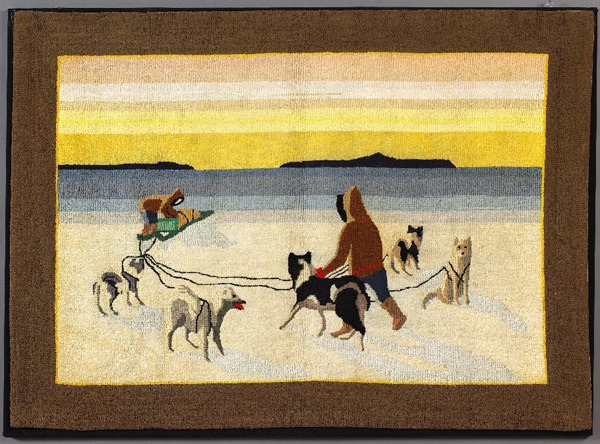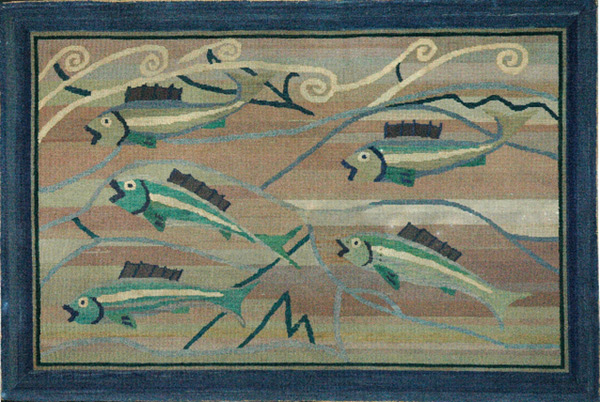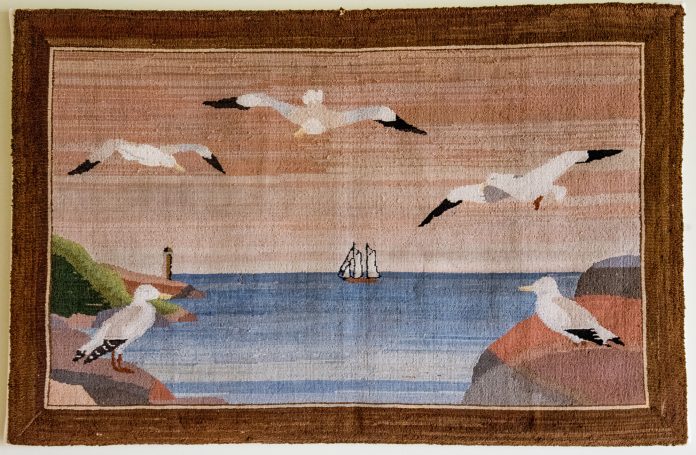By Shaun Markey –
As a collector and part-time dealer in country furniture and folk art, hooked mats made by the Grenfell Mission are always on my radar. It’s possible to find Grenfell work at church bazaars or yard sales in Kitchissippi.
Grenfell hooked mats and mats have a style of their own. As such they are fairly easy to recognize. However, there are many different patterns and designs and a series of seven different types of labels were used although they are frequently missing. As I have noted in the past, condition, colour, image and age are all factors that play an important role in establishing the quality of any antique and this is particularly true of textiles.
These finely hooked mats were made primarily from donated silk stockings and produced by women in remote outports of Labrador and Newfoundland on Canada’s east coast from about 1930 onwards. They were popular with tourists and were sold in various gift shops and stores.
The Grenfell Mission was established in 1892 in Labrador and the Great Northern Peninsula of Newfoundland by Dr. Wilfred Grenfell (1865 – 1940), a British doctor and medical missionary, from Parkgate, England. At the time, Labrador and Newfoundland was an isolated British colony and would not become a province of Canada until 1949.
The Great Northern Peninsula is, without question, and I can personally attest to this, one of the most fascinating places to visit in North America. The environment in which these mats were made undoubtedly adds to the charm and appeal with their finely executed “far north” images and scenes. Dr. Grenfell apparently created several of the early designs.
Already experienced in attending to the medical needs of fisherman in the North Sea because of a three-year stint on medical ships dedicated to that purpose, Dr. Grenfell first visited Labrador in 1892 where he discovered the bleak living conditions of the inhabitants, predominantly aboriginal people and British immigrants. On that first trip he travelled the coast of Labrador administering to the medical needs of the local residents. The population was a meager 5,000 people, widely scattered in a huge area of 110,000 square miles. There wasn’t a single resident doctor in Labrador.
Dr. Grenfell was 27- years-old when he made his first visit to the area. On the strength of that experience, he decided to make his life’s work helping these humble and hardworking people of Labrador and Newfoundland.
Although his mandate was the provision of medical services, Dr. Grenfell and colleagues went on to create and maintain five hospitals, four nursing stations, an orphanage, two large boarding schools, two hospital ships, several smaller boats, numerous cooperatives, clothing stores and industrial centres. He was convinced that the people under his care needed more than medical help. Led by Jessie Luther, an early proponent of occupational therapy in the United States, who Dr. Grenfell recruited in 1906, a cottage weaving industry was successfully introduced and developed. It was followed gradually by the hooked mat enterprise beginning in 1908.
The interest and market for Grenfell mats has remained strong for many years. While prices may be down from historic highs, even during this uncertain economy, prices for good Grenfell mats are still considerable. Smaller mats typically run in the $300 to $500 range but larger, impressive examples in good condition can command prices of $2,000 and more.
Since they were sold in gift shops and to tourists, Grenfell mats turn up in a variety of places. It is not uncommon to find them at estate sales, auctions, church sales and flea markets. Many antique dealers carry them in their inventory.


Because Grenfell mats have remained so popular with collectors, many mats are wrongly attributed to the Mission. Associating a Grenfell attribution to a hooked mat can add hundreds of dollars to the asking price. Collectors should be cautious.
Aside from the quality and artistic merit of these Grenfell mats, every one of them is a testament to the work and the mission of Dr. Grenfell and his team. Each one is a legacy, a reflection of the unyielding spirit and heartiness of the individuals who handcrafted them by the flickering light of an oil lamp in those far off communities of Newfoundland and Labrador so many years ago.
For more information on The Grenfell Mission visit: heritage.nf.ca/articles/society/grenfell-mission.php.
Shaun Markey is a resident of Westboro and author of a recently published memoir called Folk Art in the Attic. He also blogs about antiques and folk art at folkartintheattic.blogspot.ca. If you have an antique or collectable and are curious about its past and approximate value, email a photo to shaunmarkey@rogers.com. Please make sure it’s high enough resolution so that details are visible! Any extra information you can share about your treasure is helpful too. Your item – and its story – might just be published in the next column.
